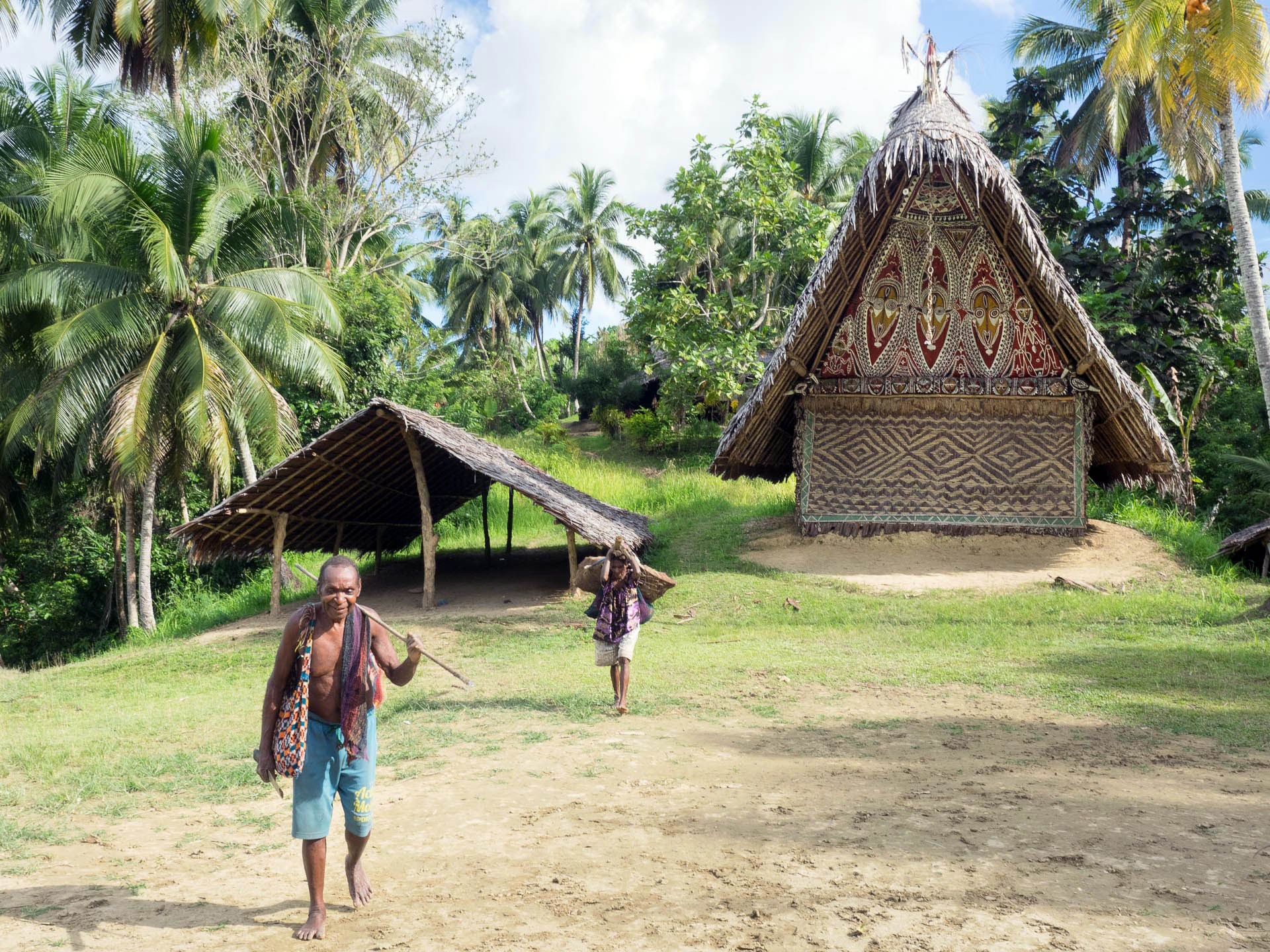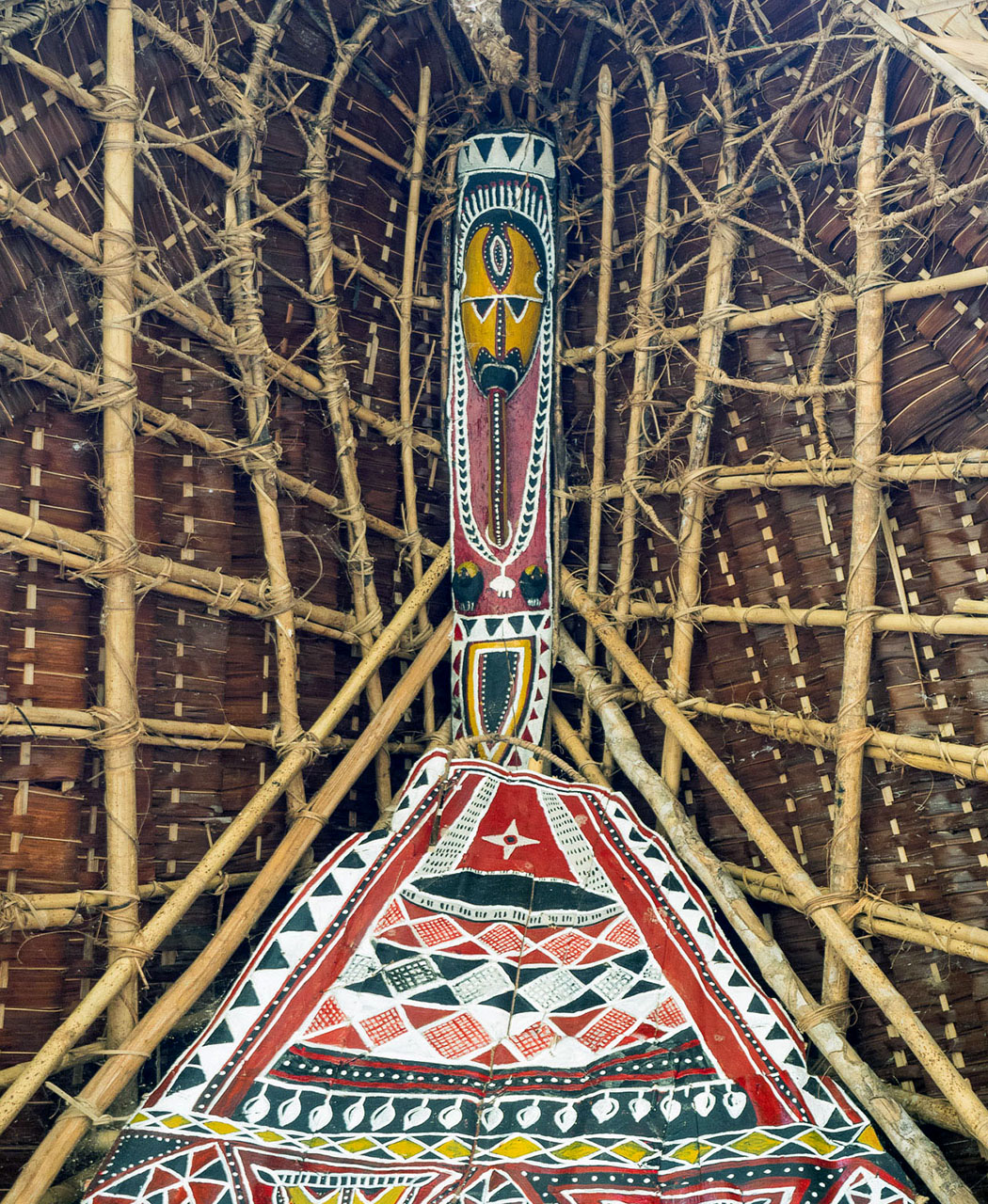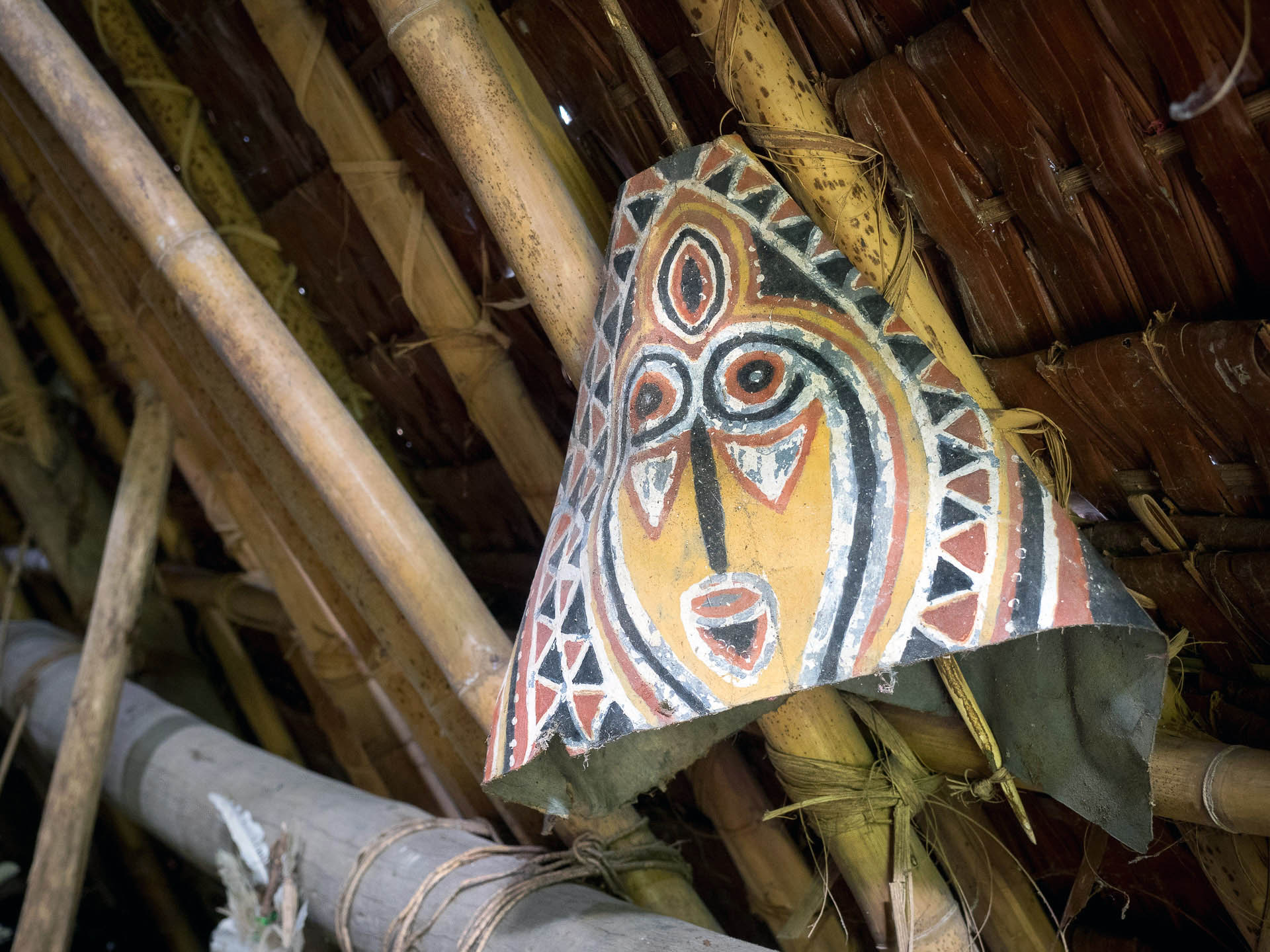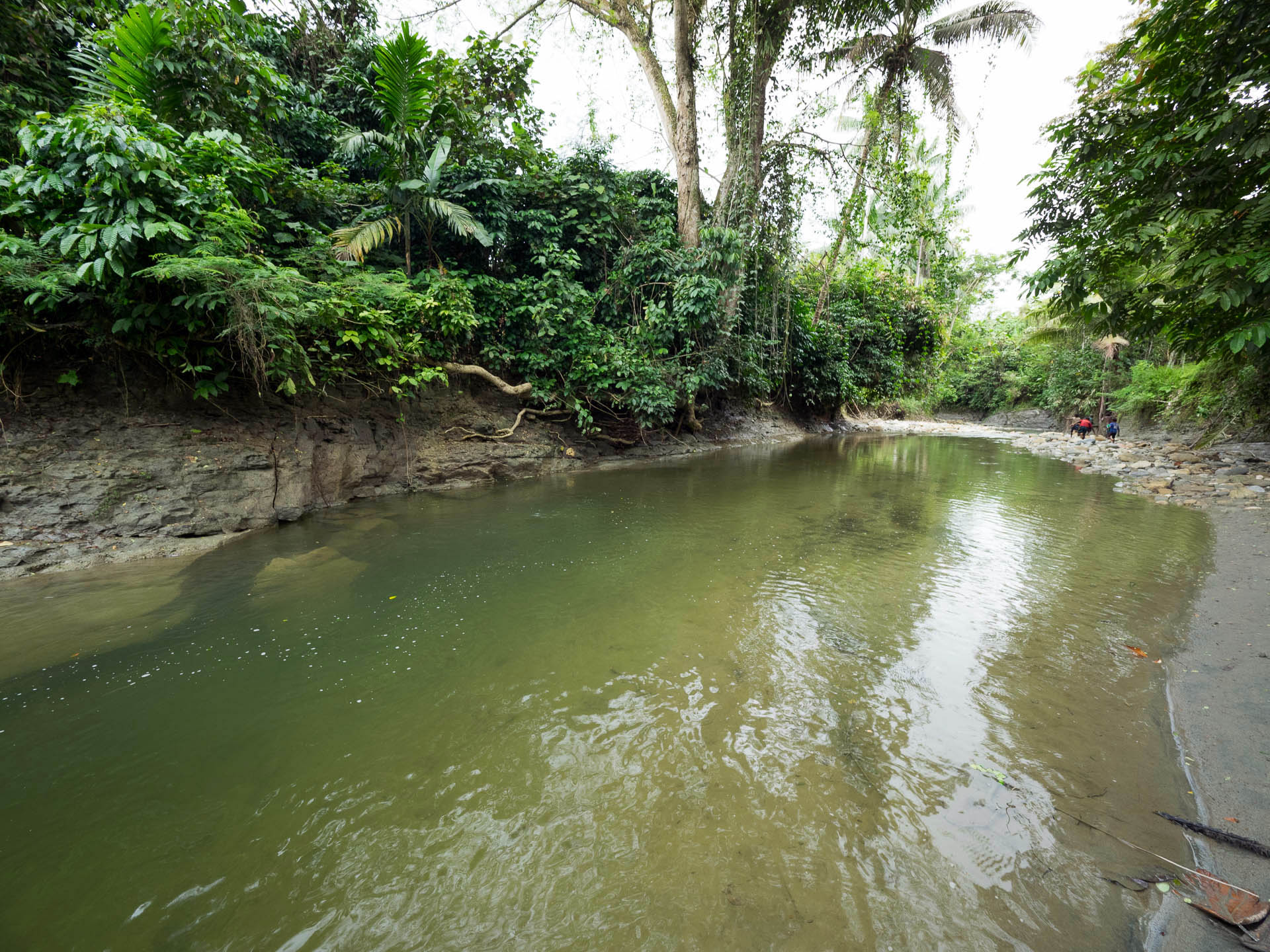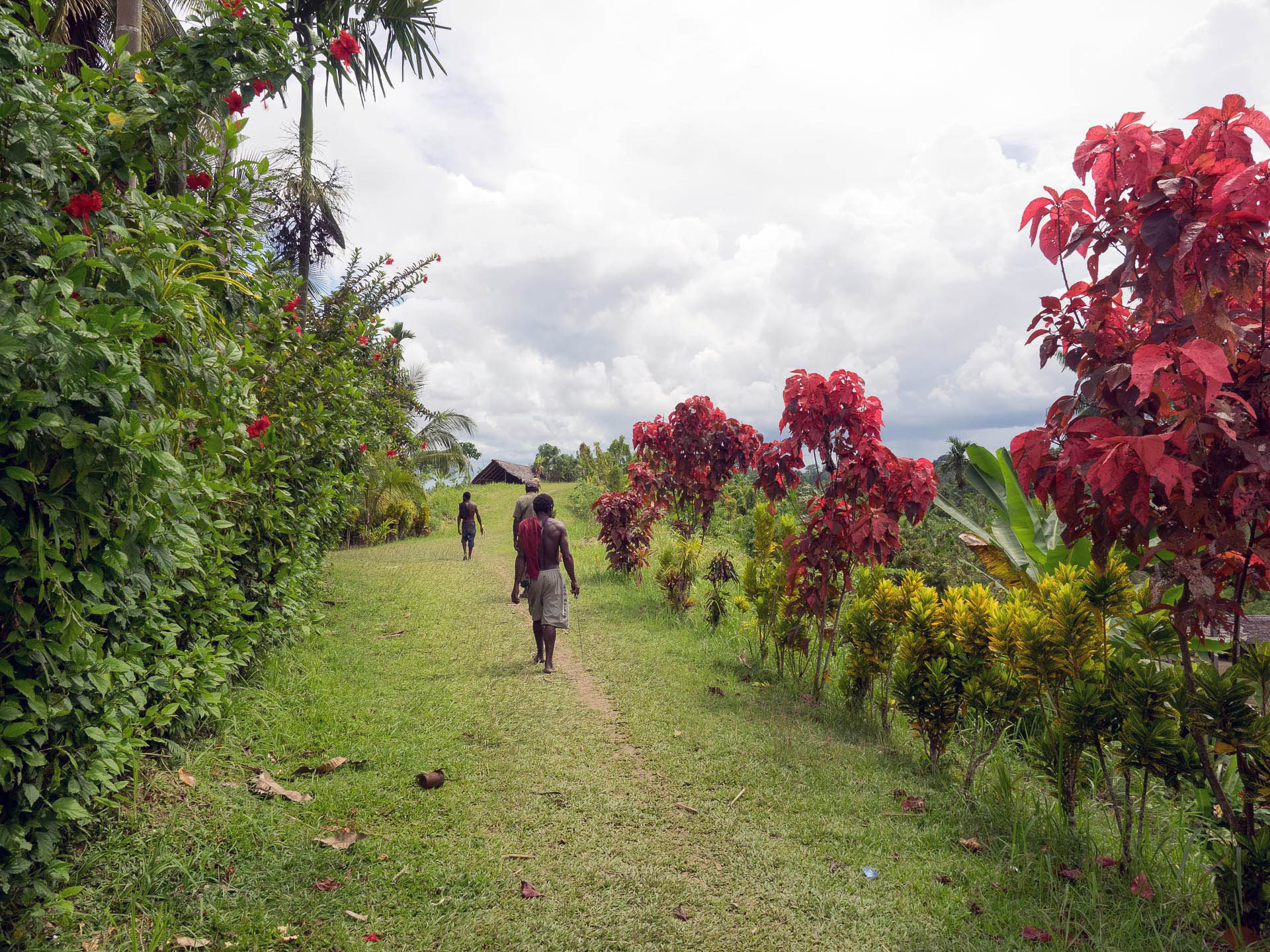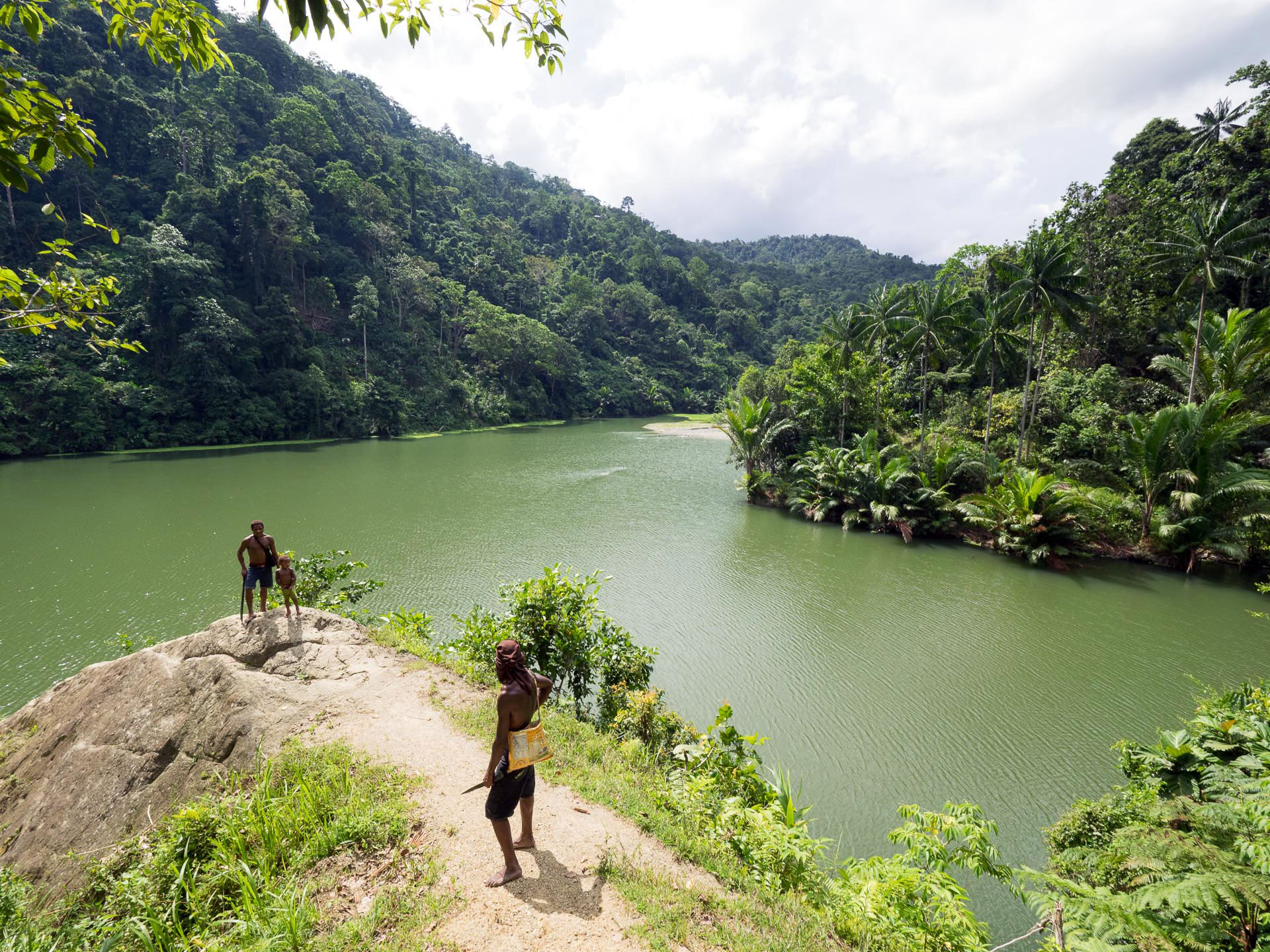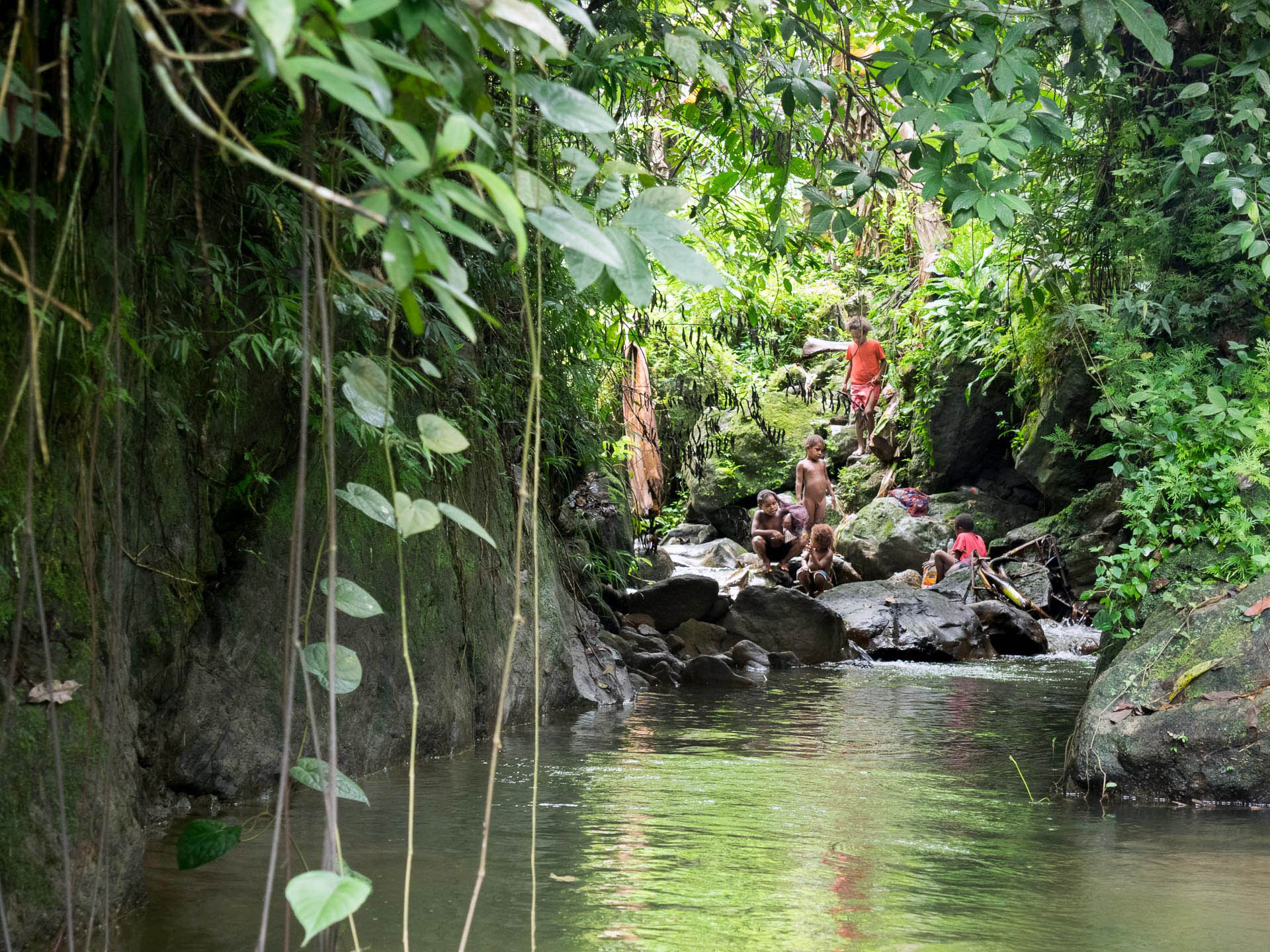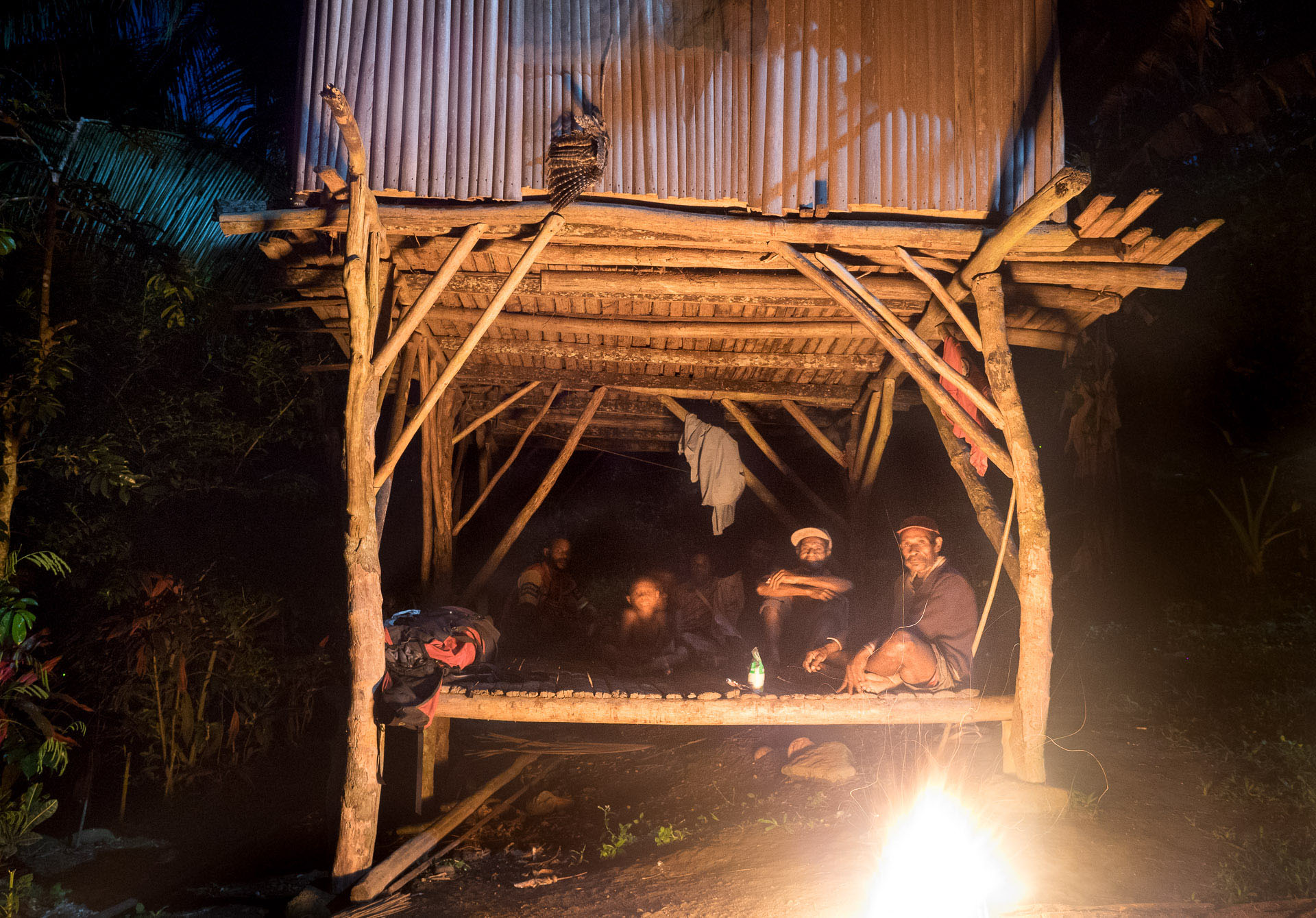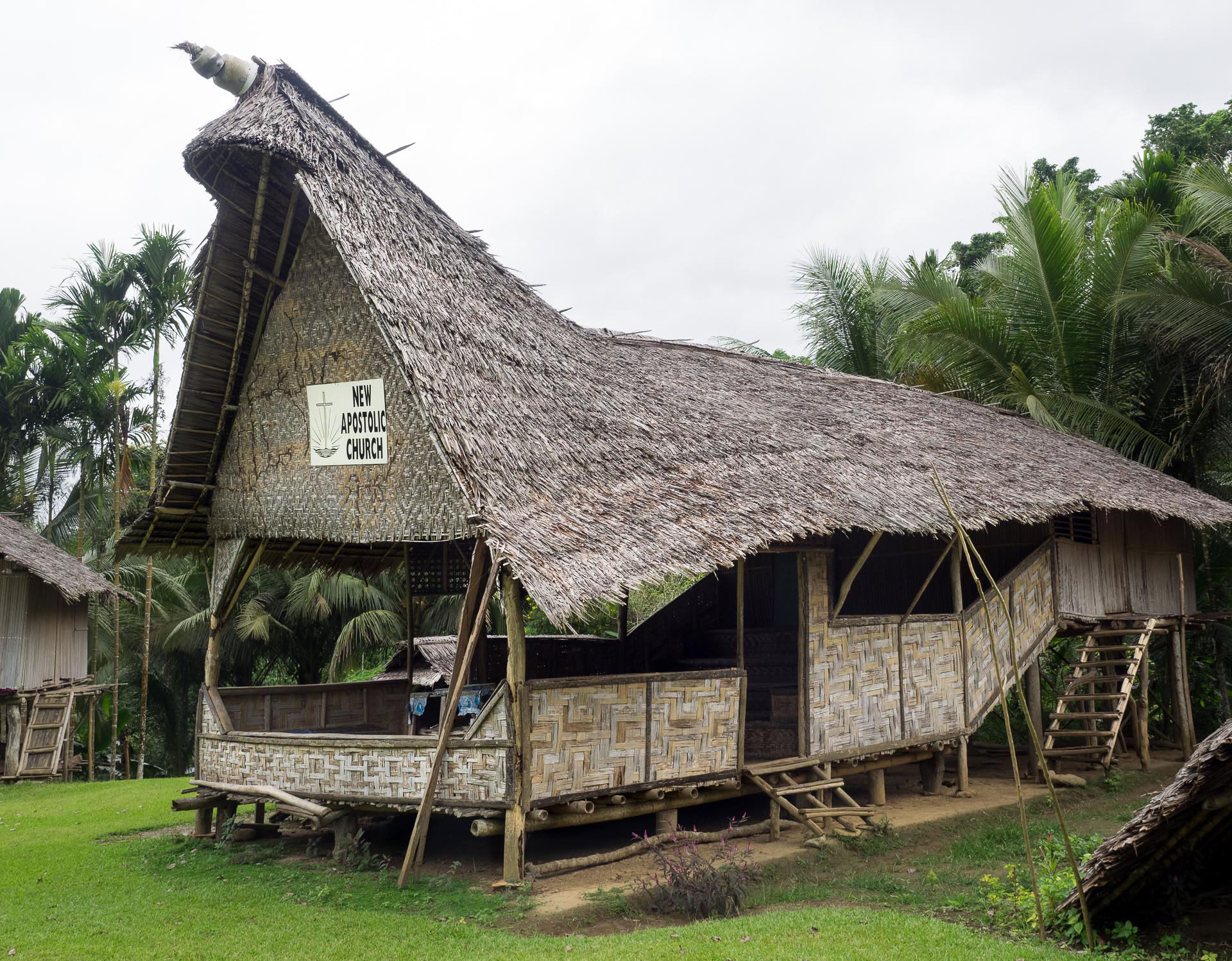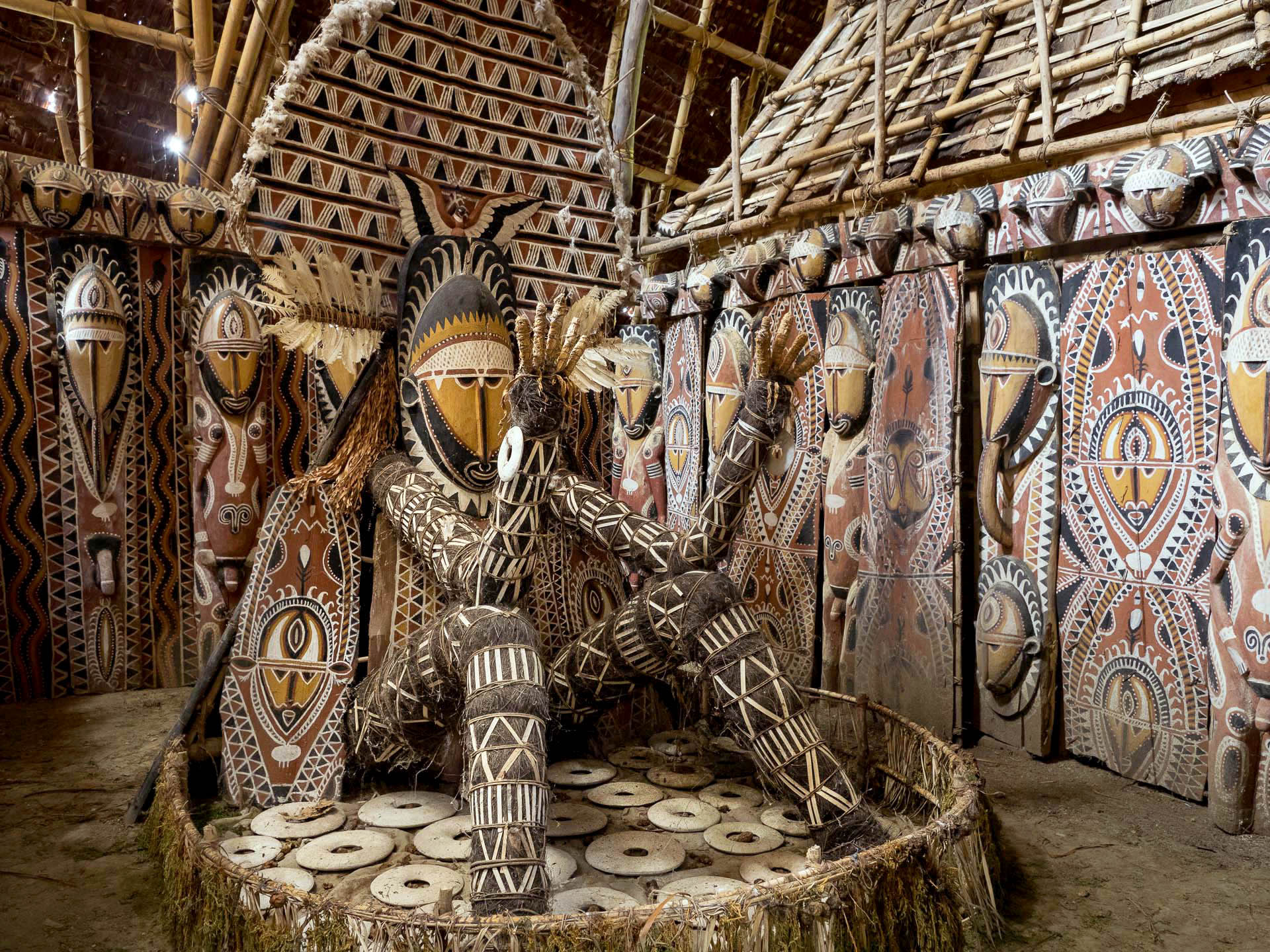
Storytellers: Wuaikua Nera, from Abelam community, Glawe Clan, and Joseph Kambaikat, Isak and Jason Andori, from Bungi community, Kumun (Eagle) Clan.
During a trip along the Sepik River, in 2015, I heard a Kwoma myth-story which tells about a powerful spirit-man who became a yam (a sweet potato). That yam drifted down the Sepik and spread around Maprik, where the Abelam tribes were living. (Read that story here.)
From the Kwomas, I also heard about Wuaikua Nera, an Abelam artist who, together with a few of them, was invited by an Australian museum to show their ritual artwork.
The colourful Abelam culture, their spirits’ houses, ceremonies and myths, relate with the yam cult.
I followed the story and two years later I spent a week at Wuaikua’s family, in Brekiti, close to Maprik. From him, I recorded the story about the deity which brought the yam to their lands. Then, the night before I left Maprik, it happened to sleep in Imbiap, a neighbouring village. There I met the Bungi people, and some of the best storytellers I know so far. Joseph Kambaikat with his friends told me their version of the same myth and brought to life their “God of food” named Wabiken.
Below is this myth-story. I joined the two versions, taking whole paragraphs from each one, so as not to change the phrasing. I eliminated the repetitions and some dialogues which occurred during storytelling.
Before reading the story, it might help to check the glossary and the captioned photos here.
Wabiken
My clan name is Glawe, it’s a blackbird from the forest. It stays on trees, and at night it sleeps on the sago leaves. It cuts a leaf and sleeps there. But this story belongs to everyone, to all communities. It’s the story of this man who gave us food. The God of food. The name of the story is Wabiken.
Before, people were eating wild taro. It’s not good taro, it scratches your mouth and neck. This spirit-man brought us good food, and now we eat it and live on this ground. Wabiken is a short man, one meter or one and a half meter. His power stays at his chest, inside his bilum.
When he was a boy, he was walking around, and we looked after him. Now, he is a stone, but he turns into a man and comes around.
A long, long time ago, there was a man, his name was Gombendiau and the name of his wife was Sualokuain. They were working in the garden and used to pee in the hole of this black spider. They didn’t think that something will come out from there. Every day they were doing the same.
Time passed and this spirit-boy, who came out, grew up. One or one and a half meter, something like this. Now, he stays in this garden.
When the two come to work, they see: Eii, our papaya is gone! Yesterday I saw it here, and now is cut. Forget it. They keep it in their mind and return home. Another day, working in the garden they see some sugar canes are ready to harvest. OK. The next day, they come again and the sugar cane is cut. Eii, I saw four big canes, and now I see only two. Who took them, ha? Every time, it happens the same. The two are angry. What man steals our food?! Where does he stay?
One day, when the two finish working in the garden, he talks to his women.
– We’ll trick him that we go home, but only you go, I stay to watch. I hide in the sugar cane. You make a fence of canes, cover me, and pass me the end of the rope.
They set it up close to this banana tree which is loaded now. When it’s finished, the women pass to him the end of the rope, takes his shell-kembang, and walks away.
Her man says loudly: Take some firewood too, I’d like to make a fire and sit at the fire. Put everything in the bilum and we go. She makes noise with this shell-kembang so that the boy thinks: oh, they are going home now.
Short after, he sees a little boy jumping and coming easy-easy. The bananas are ripe. He climbs up, takes a banana, and then, this father of the banana tree loses the rope and the sugar canes fall. Standing at the base of the tree, he says: Aaaa, you are this kind of boy, ya?! Every time you come to steal, ya?! Is this your garden? Ha?! Now I’ll kill you! I saw you come to steal! You thief, come down, hurry up!
When he talks like this, the spirit-boy stays on the tree.
– No, father, I’m your child. I’m your true child.
– No, no, you are not our child!
– Remember? You used to pee into that hole, at the edge of the garden. I came out of this spider hole. I’m your child, I came from your pee.
– Oioo! You’re my boy, ya? OK, OK, come. He hugs him, he’s very, very happy. Nice, nice, nice! He hugs him, throws him up, catches him, hugs him again. He puts him on his shoulders: come, let’s go home.
They walk now. Sitting on his shoulders, he talks to Gombendiau.
– When you bring me home, you can’t put me in the same house with you two. You work a separate house for me, away from the house where you two stay.
When they arrive, he leaves him behind the house. You saw we make this tail of the house, he puts him there. He stays a while, and then talks to his wife, to Sualokuain.
– Did you cook?
– Yes.
– Good, you must prepare three plates.
And his wife prepares three plates. She gives him the food and goes to call the boy. She looks behind the hose, but he’s not there. She sees only a nest of white ants. Are these strong ants, which cut into any kind of wood.
– Hey, I didn’t see him. Where’s the boy?
– Did you look well?
– He’s not there.
Now her man goes out and sees the boy siting. Ei, what did the woman looked at? Why she didn’t see him? He tells him: Don’t hide from your mother. You must show yourself to her. Come. And they go to eat.
Now they work a house for him, and this spirit-boy is happy seeing the two take care of him. When the two finish the house, the two put him in, and now he stays in his house and the two stay in their house.
Time passes. The two, Gombendiau and Sualokuain are living naked. Like the man and the woman from the story. In the Bible, on the side of the white man, they call them Adam and Eva. Ours are Gombendiau and Sualokuain. The two, the mother and the father, didn’t do anything, the boy didn’t come out of his mother belly. They didn’t put their bodies together.
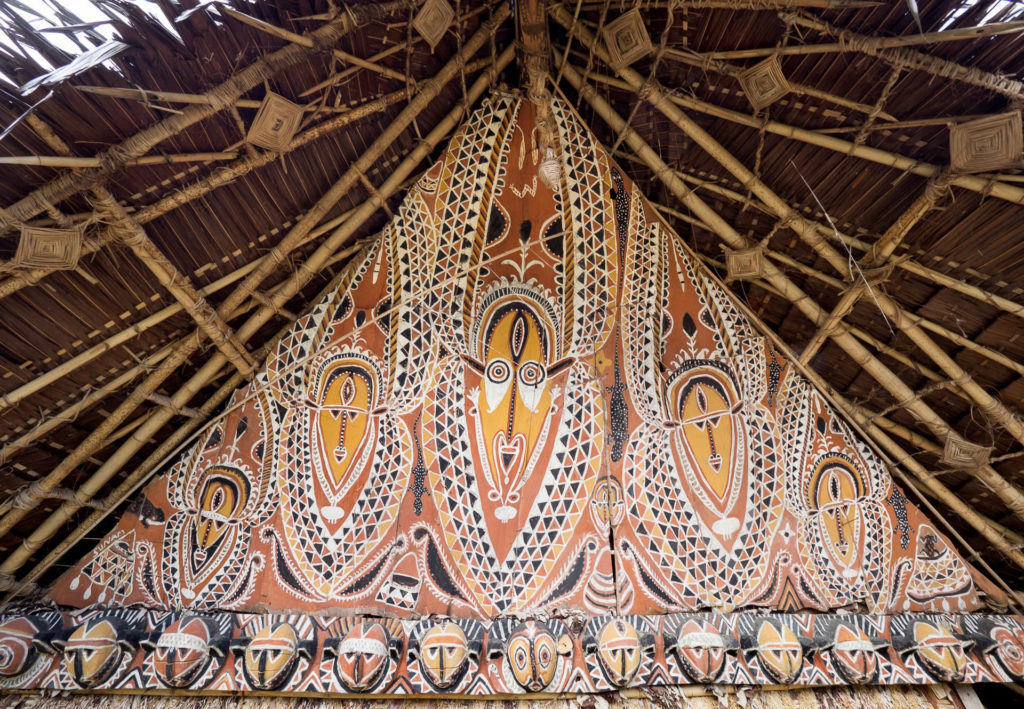

One day, in a village there’s a singsing for the wild taro.
It was a long time ago, at the time of the story, the big mother of Hansen, and Iginas mother called that village home. We forget the name of this village. We heard the story only.
Ok, now they start to beat the garamut. Beating, beating, beating, and everyone knows there will be a singsing. Ooo, I’d like to go to this singsing. The boy begs: Hey, father, I want to go with you! The woman: me too!
– You stay, with your mam.
– No, father, I want to go.
– OK, OK, come.
And now he goes with his father. The go, go, go, following the sound of garamut. They arrive at that village and go to see their taros. The people tie the taros to sticks, decorate them, line up them and singsing. When they arrive, the boy touches one taro which falls and breaks. All the men who are lining their taros get angry with him: Hey, what are you doing?! You bring this boy to destroy our things?! You can’t do this. Go back to your place! You shit people! What if we come to destroy something at your place? Ha?! They throw all kind of words at them: you’re fucked, rubbish people, you go from here. And they continue the singsing.
Hearing them, he feels sorry for the boy. They stay aside now. The spirit boy cries and says: I will return your taro.
Now, they cut these wild taros, and share them. One piece for each one, to take it back to his place and plant it. And they give them one too. The father takes it, and they go home.
The next day, the boy tells his father: We clear a patch of forest to make a garden.
It’s hard work. In the morning, the two go into the forest, mark the place for the garden, and in the afternoon come home to sleep. The next day, when the two go to cut the trees, they see the trees are already down. The next day, they go to burn the trees and the branches. They try to light the fire, but the fire dies. Try it again, but the fires don’t burn.
– Aaah, forget it. We come back tomorrow when the sun is strong. The next day, the two come to put fire, but they find everything already burned. They return home and wait quietly until the next day. At dawn, the two go to clean the place after the fire. The boy says: I will mark the spots for the taros. And he walks pressing his heel onto the ground. Finishes and they return home.
The next morning, the two come to the garden and see that plants appeared from the footprints. It’s not wild taro. These are yams now, the real yams, in their garden.
The boy tells him:
– Father, you work now. Go and cut sticks, and plunged them into the ground for these yams to climb onto. When it’s done, the two go home and sleep. When they sleep, the vines of these yams are growing thick, they climb on the sticks, their leaves are growing large, and the sterns of yams are getting big.
Now, the two are happy to see that everything is ready. OK, we gonna reply to them for that taro. The spirit-boy gives this thought to his father.
Time passes, and the yams are ready for harvest. The two go now to pull them out. They try to pull one, but it doesn’t come out, so they start to dig. The yam is long, it goes deep, it’s hard work. In the afternoon, they go home to sleep. The next day, the two return and see that all the yams are out. They try to carry them home, but they are too heavy. Leave them, we’ll take them one by one. The next day, they find all the yams at their house. Ooo man, everything is home now!
Before the yams are ready to harvest, the boy tells him: we’ll work four big houses, for yams. One we’ll place it like this, one like this, one like this and one like this. We’ll arrange them in four corners. And they go to harvest.
Now they line up their yams, tie them to sticks and decorate them. They bring wood, carve it with all kinds of designs, and put them on the yams’ heads. If the leg of the yam is split, they design a woman face. If it’s long and straight, they carve a man face. They put colours and feathers of rooster and bird of paradise. Finish this, they start to beat the garamut, and people know there will be a singsing.
The mother of this boy starts to cook. Many people are coming, and she cooks alone for all. At night, they keep coming from all places, and she gives food to everyone. In the morning, it’s plenty of people there. They eat and go to see the yams.
– Oooo, this is a different kind of food. They taste it, and it doesn’t feel like the wild taro. This is sweet, it’s good food. Where did you take this from?
Now, the man talks to them: Aaa, this food is good, ya? Last time, when my boy broke your taro, you throw all kinds of words: you’re a shit, you two are rubbish people, ya? You were eating that rubbish taro, which scratches your neck, and you call that shit food? Now you come and eat my good food. Don’t you feel shame? You don’t have anything good to eat. Our food tastes good, you like it too, ya? They keep their moth, they all did wrong in their village.
The singsing goes all night long. In the morning, the two cut these yams. You losers, take this good food back to your village and plant it! And forget your wild taro. And they make a singsing for this yam. Everyone takes two pieces. One they eat, and one they plant. And now, around Maprik we have long yams, and all our customs and singsings come from this spirit boy.
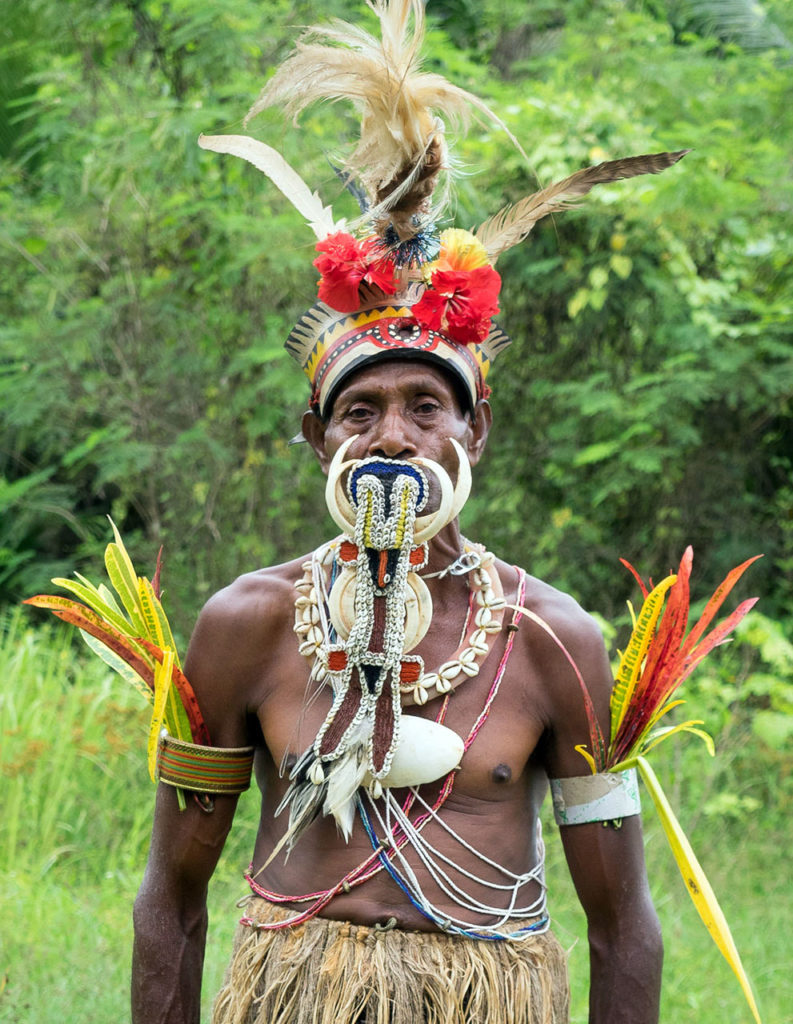
Time passes, and Gombendiau and Sualokuain go-to plant yams. Now, he gives them a law.
– You saw the work I did, you saw all this food which came out of nothing. Na, you must trust me, you must believe in me. You shall not have sex. I give you six months. Until the yams are good to harvest it’s taboo to have sex.
One day, he cuts the hair around the mouth. Gombendiau shaves his women’s face. Before, only women had hair on the face. Men didn’t. Now Gombendiau cleans her, and looks at her: she looks good.
The next day, all the boys in the village go to the river and this spirit-boy follows them. The name of this water is Wabiken. It’s down there, close to Apangai One. I can show it to you, you can take photos.
Now the boys are at the river, and the big mother of rain comes with strong wind, making a big noise.
When the boy is out, the father thinks to have sex. It was the father, the mother didn’t think like this. He wakes up and pushes the mother.
– Hey, what did the boy told us? says the mother. We can’t do this, it’s taboo.
But the father is stubborn. He’s aroused and his thing is tight, you know, like the bow.
– Forget it, I’ll have sex with you now, I can’t stay. He’s right. And now he makes sex with her.
The rain starts and the boys run to their houses. This spirit-boy felt the smell of sex and stops beside the house. He can’t go any closer. It’s raining, and his father and mother call him: hey, my child, come inside! Why do you stay there? I can’t!
He turns back and slowly, slowly goes down to the water. There’s a tree lying in the middle of the stream, and he stops there. Worried, Gombendiau and Sualokuain go to take him home, but no way. The tide is strong now. He tries to grab him by the hand, but his hand breaks from the body. He holds his hand only, and the tide takes away the boy.
They broke the law. If they had listened to him, we wouldn’t work so hard now. It would be easy for us to get what’s inside this ground.
When they break the law, he tells them: you woman, you’ll feel pain when you’ll bring children! You man, you’ll cut the forest, climb the tree to cut them, burn them, and plant the yams. This is your work! He talks straight to them. And now he gives us these two hard works.
Now, when we plant yams, we can’t have sex for six months. This is his law.
You saw a bridge when you came here (to Imbiap), that’s where the boy fell into the water. He started from Apangai, and there’s a village which you see when you come here, the water took him that way. He followed that water, arrived at Amagwi, and saw the Amagwi river has clear water. Close to Amagwi there’s a confluence, and one stream is clear. Ok, so he follows this clear water upstream, and then leaves it and follows another water, all the way up to a lake. And now he stays at this lake. He stays at a cliff, where is a cave. When it rains, you can hide there, it’s a good place.
On that mountain lives an ancestor of us. Now, this big man comes down to the water. You know, this lake upstream the confluence, there’s a masalai living there. OK. This big man comes to the end of the lake and sits there to sharpen a stone axe. As he works, a small rain starts to fall, and he moves to this cave. Now, he sharpens the stone axe and sees that something gets inside his small bilum. Ei, what’ here? A flying-stone, or what? He takes it out and throws it away. He keeps working, and again that something comes into his bilum. He takes it and throws it. It’s still raining, and he sits and sharps. And again, that something comes to stay inside his bilum. When it’s inside his bilum, the rain stops. Eiii, what’s going on? What comes to stay into my bilum? He gets up, throws it away, takes his stone axe and leaves. He goes to another place, makes a fire, and stays there overnight. He sleeps now, and a dream-man comes. This something, that he threw away, talks to him.
– Tomorrow, you wake up and make a sacrifice. You shall not eat, you shall not stay with a woman, all these are taboo. You must wait for one week. You cut a yaman limbun, make ropes from the veins which climb onto trees and work a house for me. For the posts, you must work on redwood. For the roof, you use this morota. For my fire, cut red kuambi, a tree as that one, and light it. That’s my bed, for sleeping.
The dream-man tells him how to work everything.
He rests, then wakes up, washes, and drinks water with lime. And now, he must go down to the water, to make a cut on his dick, a little bit of blood must come out. He uses a bamboo blade, now we use a razor blade. He feels the pain. The girls, they feel their pain, we, the boys, use to do this cut. It gives strength if you go to fight or to undertake something. It’s a sacrifice we men do. We stay at the fire, we eat only what we hunt, we cook it dry on fire, and drink only hot water from bamboo. When the sacrifice is done, we can go to fight. When you go to a fight, you look at the boys standing up, you see this something. Now, he’s making a sacrifice like this. He follows the words of the dream man.
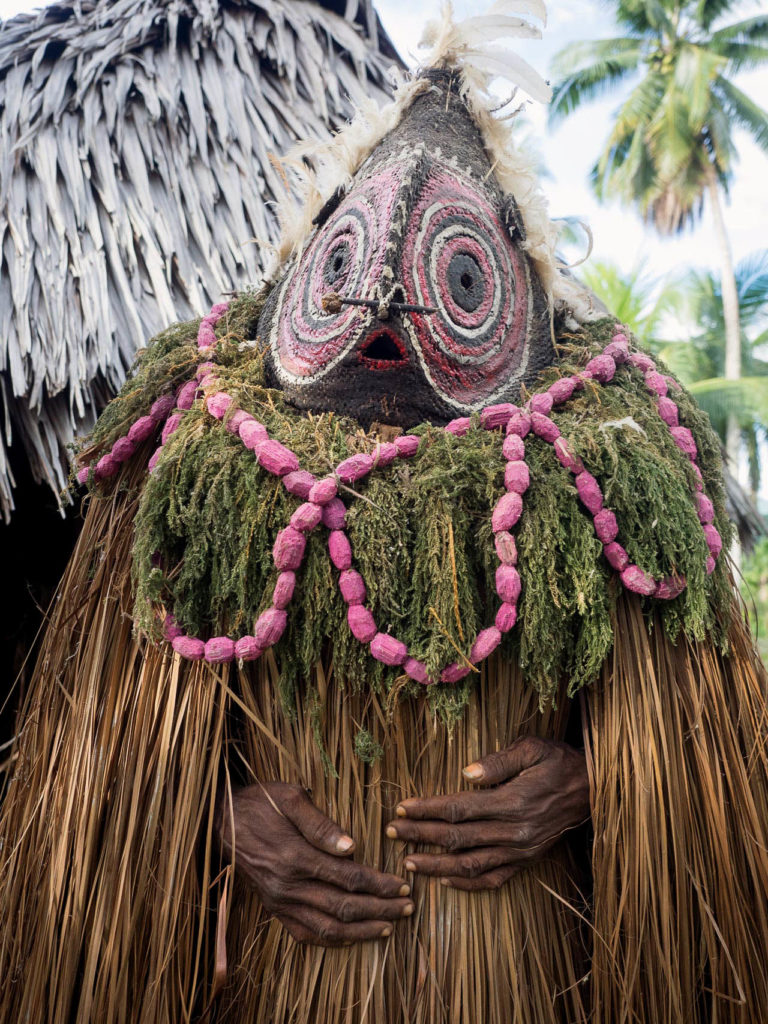
At dawn, he walks and sees the little boy stays on a side of the valley.
He has told him: “You make a bad, cover it with limbun, and put these leaves on it. You cut red leaves – kuambi, put them with the rest, put me into it, and carry me down to the village”.
Now, he works all these, puts him on, ties him well, and takes him to the village.
They eat and the spirit-boy tells them:
– I can’t stay here. You must take me to the top of the mountain, where you’ll make my house. I will look over all settlements. You’ll take only the big boys to work it, you can’t use the big men. It’s taboo to rest one day.
Now, the big boys take a rest, and the next morning, they take water with lime, in bamboo, and start to work. They work and work until they finish the house. Now, they bring there this God, Wabiken. He tells them: If you believe in me, you will get all kinds of food. Now we have all kinds of yam and fruits.
Wabiken appeared in Apangai, in a place called Wabilin. His hand, the one ripped by his father, stayed in Apangai. His body is here, on top of the mountain. We (Bungi) are the key to all communities.
When people from a village want to plant yams, they slaughter a pig. One leg they send to the village close to where Wabiken stays. The men gather, cook and eat this pig leg. The smoke goes up, to the mountain. He feels the smell as if he eats. He blesses them, and they will harvest long, long yams.
There’s no one singsing for him. When you harvest the yams, and you are happy and sing, that’s is his singsing. When you decorate your big yams, that’s his singsing.
If there’s light in a house, he comes. But in dark places, where people do all sorts of things, he doesn’t go. We didn’t see him, this is something from the big-men time. We only heard his story.
Now, we can still see his power working, and we have this belief. He is like a God of the ground. He’s not a statue only, he’s alive, like a man.
When your mam puts your plate with food, but you don’t find it, you ask: mam, where’s my food?! Ei, I just put it there! Naa, this is the little boy. When something like this happens, you know it was him.
His name is Wabi-ken, because of those people who were angry with him over the broken taro-yam. Wabi means long yam. That’s how his name came.
(The name is also spelt Wabikain, Wapiken, or Wabigen. In Imbiap, his father name is Gumbedi and his mother Gumbenda.
Bellow, there are more captioned photos related to this story. You find more photos from the Abelams here.)
